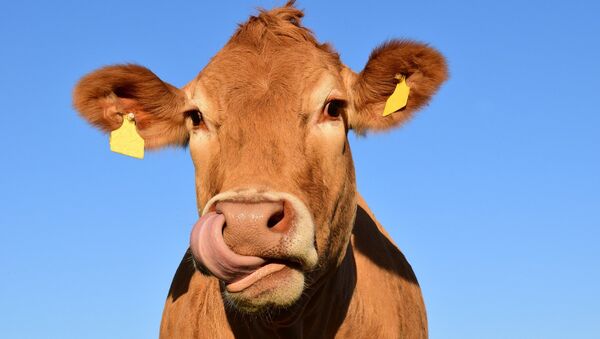BSE — commonly known as mad cow disease — was found in Aberdeenshire, northeast Scotland.
"Precautionary movement restrictions have been put in place at the farm, while further investigations to identify the origin of the disease occur. This is standard procedure for a confirmed case of classical BSE, which does not represent a threat to human health," the Scottish government said.
Despite the reassurance by Holyrood there was no threat to human health, the news caused an uproar in the commentary sections on social media.
That's harsh
— Geri Ohara (@geriohara) October 18, 2018
I had no idea the POTUS was going to Scotland.
— Allan Crane (@AllanFSP25) October 18, 2018
— Hordak (@evilhasnoname) October 18, 2018
I didn’t know Theresa May was in Aberdeen
— dinassteve (@dinassteve1) October 18, 2018
I blame Brexit 🤔😂
— Trevor Howson (@TrevorHowson) October 18, 2018
Did I see someone mentioning mad cow disease in Scotland? pic.twitter.com/v0pKcidr2g
— Phil (@POTBO62) October 18, 2018
News: "There's been a reported outbreak of Mad Cow Disease on a farm in Aberdeenshire."
— Father Of Egon (@FatherOfEgon) October 18, 2018
My Mate Kevin: "Looks like Theresa May made a stop off in Scotland!"
Me: pic.twitter.com/Bu89APk5tq
Mad Cow Disease has been confirmed in UK. It was detected as Theresa May reentered the UK after her trip to EU. Sources say that she contracted the disease after a recent speech in a cowshed to a small group of Tory staff & press. Concerns are that she spread it to Aberdeenshire. pic.twitter.com/9al3E49p35
— Alexander L. King (@1101LittleOne) October 18, 2018
However, the sarcastic comments online were condemned by users who accused the jokers of being childish and failing to realize the seriousness of the disease and its consequences.
I'm 32, my dad was a farmer and our cottage was right next to the field where they were burning carcasses… I've been vegetarian since. It was hellish and I still remember the stench. They seem confident that they can contain it though so here's hoping that this is a solo case.
— Melissa (@Melissammkay) October 18, 2018
Following the announcement on Thursday, Ian McWatt, Director of Operations in Food Standards Scotland said:
"There are strict controls in place to protect consumers from the risk of BSE, including controls on animal feed, and removal of the parts of cattle most likely to carry BSE infectivity. Consumers can be reassured that these important protection measures remain in place and that Food Standards Scotland Official Veterinarians and Meat Hygiene Inspectors working in all abattoirs in Scotland will continue to ensure that in respect of BSE controls, the safety of consumers remains a priority. We will continue to work closely with Scottish Government, other agencies and industry at this time."
First instances of mad cow disease in Britain were recorded in 1986. In 1996, it was confirmed BSE could be transmitted to humans in the form of Creutzfeldt-Jakob disease.
The BSE led the European Union to ban British beef in 1996. The ban that lasted 10 years was finally lifted on May 1, 2006, with France holding off from importing British beef even after the ban was lifted.
Other countries also kept the ban, with China only lifting the embargo in June this year.


